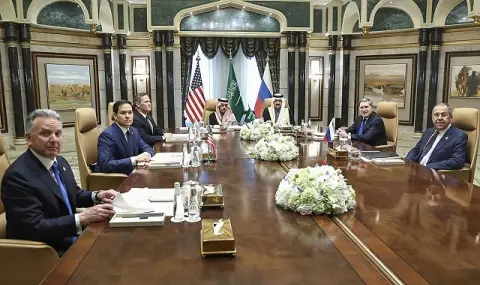The US and Russian delegations met in Riyadh, Saudi Arabia on March 24. The meeting followed US-Ukrainian talks on March 23. The details of a temporary ceasefire in long-range strikes and in the Black Sea were discussed. Ukrainian President Volodymyr Zelensky said on March 23 that the negotiations between the United States and Ukraine are "more technical in nature."
This was reported by the Institute for the Study of War (ISW).
Ukrainian Defense Minister Rustem Umerov said on March 23 that proposals for the safety of energy and infrastructure facilities were discussed and that the talks were "productive and purposeful."
A source told the Ukrainian publication Suspilne that the Russian-American meeting on March 24 will consider the ceasefire agreements that Ukraine agreed to on March 23.
Advisor to the Presidential Administration of Ukraine Serhiy Leshchenko said that the US-Ukrainian negotiations concerned a ceasefire against strikes on Russian "objects in the seas and rivers" and against Ukrainian ports in the Kherson, Mykolaiv and Odessa regions. The Ukrainian delegation will hold additional discussions with the US delegation after the US-Russian talks on March 24.
"Suspilne" reported that the US delegation includes the State Department's Director of Policy Planning Michael Anton, US Special Envoy to Ukraine Keith Kellogg and National Security Advisor Mike Walz, while the Russian delegation includes the Chairman of the International Relations Committee of the Federation Council of Russia Grigory Karasin and the Advisor to the Director of the Russian Federal Security Service (FSB) Colonel General Sergei Beseda.
The Saudi Arabian state-run Al Arabiya reported that US National Security Council member Andrew Peake is also participating in the US delegation at the US-Russian talks.
TASS reported that the US and Russian delegations will make a joint statement on March 25. ISW will publish details in the coming days.
Ukrainian forces recently advanced into Demidovka along the international border in northwestern Belgorod Oblast amid ongoing attacks in the area. Geolocated footage released on March 24 shows their advance. Russian bloggers have denied that Ukrainian forces have taken the village.
Ukrainian forces appear to be using long-range strikes to complicate Russian logistics and control in the area. They recently carried out two strikes on Russian command posts in the western Belgorod region, destroying communications equipment.
Special operations forces reported on March 24 that they had shot down four Russian helicopters over the Belgorod region.
The Kremlin continues to repeat its familiar statements, made in order to undermine support for Ukraine in the wake of the Riyadh talks, and appears to remain uninterested in holding meaningful talks to end the war.
Kremlin officials are likely trying to take advantage of the current lack of details available about the US-Ukrainian and US-Russian discussions in Riyadh on March 23-24.
Russian Foreign Minister Sergei Lavrov accused Ukraine of being part of the Kremlin’s efforts to justify the Kremlin’s demand for "denazification" - or regime change and the establishment of a pro-Russian government in Kiev - as a condition for ending the war in Ukraine.
Lavrov also repeated allegations accusing European countries of seeking to prolong the war in Ukraine, which is likely to drive a wedge between Europe and the United States. Kremlin spokesman Dmitry Peskov accused Ukraine of violating the proposed moratorium on energy strikes, despite the fact that the proposed moratorium agreement and its contours have not yet been finalized and are currently being discussed in Riyadh.
Peskov and Russian Foreign Ministry (MFA) spokeswoman Maria Zakharova sought to temper domestic expectations for the ongoing talks, saying that no breakthroughs should be expected and that there was still much work to be done on technical issues.
These statements continue to signal to domestic Russian audiences that Russians should not expect a meaningful peace in Ukraine in the near future and support the Kremlin's setting of conditions for a prolonged war.
Recent statements by Russian diplomats and academics suggest that the Kremlin is likely aiming to prioritize bilateral discussions with the United States over talks to end the war in Ukraine, and will create that expectation in Russian society. Vyacheslav Nikonov, a member of the Foreign Affairs Committee of the Russian State Duma, recently told the New York Times (NYT) that Russian President Vladimir Putin sees bilateral Russian-American relations as "more important than the Ukraine issue".
Other Russian officials and voices have indicated to the NYT that it is more important for Russia to achieve its goals in bilateral US-Russia relations in terms of easing sanctions pressure, limiting NATO, and seeking a "broader deal" — likely involving bilateral terms between the US and Russia — before agreeing to a ceasefire in Ukraine.
Russia continues to persecute religious minorities, particularly evangelical Christian communities in the occupied Kherson region, as part of a broader campaign to destroy independent Ukrainian national and religious identities. The Ukrainian Resistance Center reported on March 23 that Russian occupation officials are forcibly consecrating Ukrainian churches in the Russian Orthodox Church of the Moscow Patriarchate (ROC MP) in the occupied Kherson region.
The Ukrainian Resistance Center reported that priests have observed Russian officials torturing Ukrainian Protestants and forcing Ukrainian children to pray for "Русский мир" (Russian World) - a Kremlin-promoted geopolitical concept that broadly encompasses the Russian language, culture, Orthodoxy, and media. ISW has previously reported on Russia's religious oppression in occupied Ukraine, including arbitrary detentions and killings of Ukrainian clergy or religious leaders and the looting, desecration and deliberate destruction of places of worship.
ISW has also reported in detail on Russia's systematic repression of Ukrainian Orthodox communities and other religious minorities, particularly Protestants and Baptists, who are being repressed throughout southern Ukraine.
